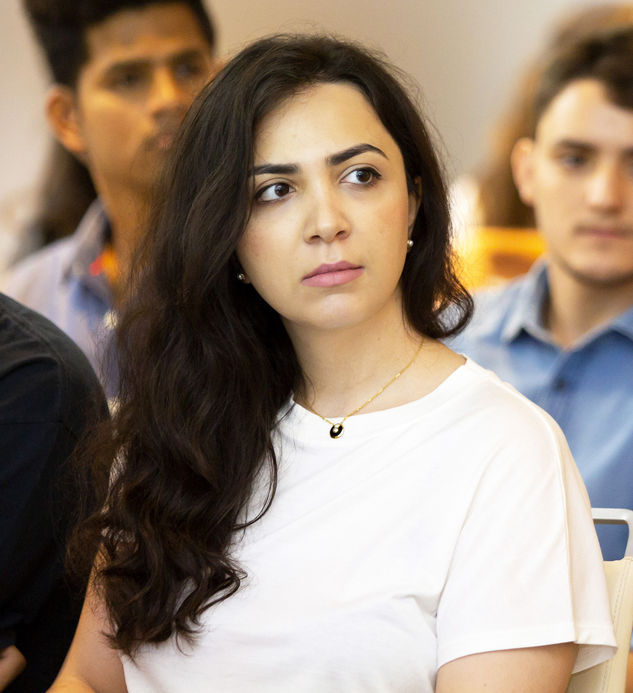Master in Tourism &
Hospitality Management

Companies require academically qualified, visionary leaders to create new business models and understand changes in technology and consumer trends in the tourism industry.
EU's Master in Tourism & Hospitality Management program explores the theories, practices and business models that make up the tourism and leisure field. Focusing on the development of management skills and strategic thinking, students will develop key industry competences as well as international and intercultural management abilities which are needed in this dynamic and fast-changing sector.
Program Structure
The Master in Tourism & Hospitality Management (60 ECTS) is a one-year program, divided into three terms. Each term comprises two subject-specific courses plus a project-based module and a skills-development module. Throughout the year, students will also participate in real-life case studies and company visits, as well as the innovative Business Immersion Weeks which take place every term. In order to graduate, participants must also complete a Final Capstone Project (6 ECTS).
(18 ECTS)
The Changing Environments of Tourism
Show detailsNowadays, no industry or no business is immune from disruption, and this is specifically true for the travel and tourism industry. It is dynamic in nature and has witnessed major changes and crises over the past century including the disruptive impact of the pandemic. Any changes in the internal business environment or external business environment covering the social, ecological, political, technological, or economic dimensions demand agility, creativity, and foresight from business leaders to adapt and strive. In this course, students will explore trends in the micro and macro environments of the tourism industry and how businesses should anticipate and adapt to those changes. In a practical approach, above findings will be applied to a real-life example.
Subject-specific module | 3 ECTS
People, Profit, Planet – Keys to Sustainable Tourism
Show detailsBecoming “sustainable” as a business in the tourism industry – just a buzzword for marketers to position an organization? Or is it rather a genuine requirement for any tourism business wanting to be successful and thus sustainable in a highly competitive environment? From an outside perspective, people tend to reduce sustainability to simply the ecological aspects. This course, however, will assess all three pillars of sustainability – the ecological, economic and social dimensions – to then apply those to selected players in the tourism industry. Students will take a highly practical approach by assessing performance indicators for hotels and accommodation provided by the Global Sustainable Tourism Council (GSTC) to then apply these criteria to selected tourism suppliers.
Subject-specific module | 3 ECTS
Winning Strategies for Market Entry
Show detailsThis is a practical course structured as a project with an iterative format. It is designed to provide a dynamic and engaging experience of executing a strategy consulting project based on a case study. Students will learn to self-organize and collaborate with teammates to solve problems and manage projects effectively and successfully by learning to implement feedback. In addition, students will learn to apply tools and soft skills that will enable them to solve challenges and execute projects as external or internal consultants, individual contributors, or organizational leaders.
Project-based module | 6 ECTS
Tools for Success
Show detailsSuccessful managers skillfully manage their resources and risks to produce a desired organizational outcome. A key and often overlooked challenge for managers is the ability to manage without influence: in other words, to gain the support of stakeholders and access to resources not directly under their control. Students will explore project management, effective negotiation and communication skills with a practical, hands-on approach through case studies and class exercises. This course will also review socio-political complexities, creativity and emotional considerations as well as approaches to maximize influence. Students will acquire the fundamental tools, concepts and behavioral skills needed to successfully lead and realize benefits from projects, negotiations and communications.
Skills-development module | 5 ECTS
Business Immersion Week
Show detailsBusiness Immersion Week is dedicated solely to business-related activities outside the classroom. Students take part in a wide range of events including company visits, escape rooms, managerial problem-solving games and entrepreneurial endeavors. Through this intense week of dynamic activities, students hone their business skills and put theory into practice.
Skills-development module | 1 ECTS
(18 ECTS)
Digital Business in Tourism
Show detailsAs new digital channels and processes continue to emerge in the travel and tourism industries, understanding these changes and harnessing the skill sets to manage new platforms is critical. This course deals with learning objectives and modules aimed at preparing students for effectively managing the complexities of immersive digital technologies impacting the tourism industry. Students will explore how applications software for desktop and mobility have been adapted to suit business needs in terms of securing travel arrangements and handling business operations related to booking trips, negotiating with tourism vendors and managing safe payment procedures. Collectively, knowledge of digital tools associated with these activities are essential for prospective workers to succeed in the tourism industry.
Subject-specific module | 3 ECTS
E-Tourism: Marketing Strategies and Online Commercialization
Show detailsE-tourism refers to the digitization of all of the processes and value chains in the tourism, travel, hospitality and catering industries. Understanding its impact on marketing, and how the latest technologies and platforms can help create and execute effective strategies and campaigns is key for anyone engaged in hospitality general management. Students will be introduced to the fundamentals of strategic and operational services marketing, with digital marketing placed within a broader, integrated communications context. The focus will then shift to digital tourism marketing, with a focus on real-world examples and practical insights into campaign formulation and execution, including the understanding and use of marketing and advertising technologies (MarTech and AdTech) to help drive marketing efficiency and effectiveness.
Subject-specific module | 3 ECTS
Strategic Development for Business Success
Show detailsThis is a practical course in strategy development structured as an agile project, culminating in creation of a strategy based on a luxury tourism case study. The course is designed to provide a dynamic and engaging experience of developing a strategy by understanding context, choices and determining goals which will determine resource allocation and defend competitive differentiation. The project will involve market research, analysis of segment attractiveness and competitive position building on capabilities and existing strengths. The final strategy will devise development of winning plays for competitive advantage aligned to the company mission and performance objectives. Students will learn to self-organize and collaborate with teammates to effectively manage content modules with group work as with a real management consulting project.
Project-based module | 6 ECTS
Developing a Leadership Edge
Show detailsThis course equips students with the skills required to become effective leaders. Students will learn how to take decisions under uncertainty, build the capabilities needed to lead across local and international boundaries, and learn how to bridge culture gaps and differences to create value for the organization. Students will further develop the ability to lead through challenging dilemmas and explore the role of emotional intelligence in transforming a good leader into a great one. This course will equip students with the knowledge and skills required to formulate contemporary leadership strategies, which will allow for both short- and long-term success. The course takes a pragmatic, real-world approach and embraces the latest thinking in leadership development.
Skills-development module | 5 ECTS
Business Immersion Week
Show detailsBusiness Immersion Week is dedicated solely to business-related activities outside the classroom. Students take part in a wide range of events including company visits, escape rooms, managerial problem-solving games and entrepreneurial endeavors. Through this intense week of dynamic activities, students hone their business skills and put theory into practice.
Skills-development module | 1 ECTS
(18 ECTS)
Hospitality Management
Show detailsThe hospitality industry is a highly segmented industry, encompassing everything from restaurants and hotels to theme parks, casinos and cruise lines. Nonetheless, these diverse segments are united by similar key trends, opportunities and challenges. Any hospitality business relies on a multitude of resources and managers must make the best use of them in order to reach the intended goals in the most efficient and effective way possible. This course will equip students with knowledge pertaining to key management concepts as well as the tools and techniques to thrive as hospitality managers.
Subject-specific module | 3 ECTS
Innovation in The Tourism Industry
Show detailsInnovation in the tourism industry has been revolutionizing the way travelers experience destinations and services. Additionally, innovative business models have enabled new opportunities for travelers and providers alike. Driven by changing customer behavior and expectations, the tourism industry is being transformed. From an outside perspective, innovations often tend to get reduced to “product” innovation. This course, however, will not only assess key drivers for innovation but also examine the various areas for innovation including product, process, business model, pricing and distribution innovations. Students will learn how these types of innovations have changed the way of doing business for the key players in the tourism industry such as hotels, airlines, tour operators, destinations and cruise companies, among others. The course will also examine the term “destructive innovation,” in order to discover whether this type of innovation could affect tourism companies.
Subject-specific module | 3 ECTS
New Product Development for Growth
Show detailsThis project-based new product development course is designed to provide students with experience in creating and developing a new product from ideation to launch. The course follows the lean startup method. The basic principle of this method is to launch a new product as quickly as possible in order to obtain customer feedback at a very early stage. This is done in a build-measure-learn cycle, which is constantly repeated to develop a product that is designed to be as close as possible to the customer's needs. Students will learn to apply this iterative approach in a concrete case study. They will not only learn the methodological basics and the required toolbox, but also the mindset, which is fundamentally different from that of classic product development. At the end of the course, participants should be able to successfully apply the Lean Startup method in concrete product, service, and business development situations.
Project-based module | 6 ECTS
Building Successful Teams
Show detailsThis course equips students with the skills required to build and lead successful, high-performance teams. The students will learn to manage team dynamics in local and global environments and navigate through corporate and cultural challenges, including crisis management, miscommunication, and conflict resolution. A hands-on approach to team development will be introduced. Considerable attention will be paid to team leadership and empowerment within an ever-changing business environment.
Skills-development module | 5 ECTS
Business Immersion Week
Show detailsBusiness Immersion Week is dedicated solely to business-related activities outside the classroom. Students take part in a wide range of events including company visits, escape rooms, managerial problem-solving games and entrepreneurial endeavors. Through this intense week of dynamic activities, students hone their business skills and put theory into practice.
Skills-development module | 1 ECTS
Final Capstone Project
Show detailsThis Capstone Project is an opportunity for students to apply their knowledge and skills from previous courses in their program to either create a business plan or expand on a previous project. Through this project, students will comprehensively understand business principles, methods, tactics, and practical insights into the tools and resources required to begin or manage a successful business.
6 ECTS
Learning Outcomes
In addition to industry-specific modules, this program focuses on development strategies and management styles geared towards creating leaders in the industry who can also apply the same skills to the wider commercial market. Students will:
- Investigate the impact of tourism planning and development on economic, sociocultural and physical environments.
- Have a systematic understanding of the hospitality and tourism service sector organizations, their external contexts and how they are managed.
- Critically evaluate the core business disciplines and methods at work in hospitality and tourism service sectors, and be able to apply these in practical contexts.
- Explore issues that concern host-visitor relationships.





